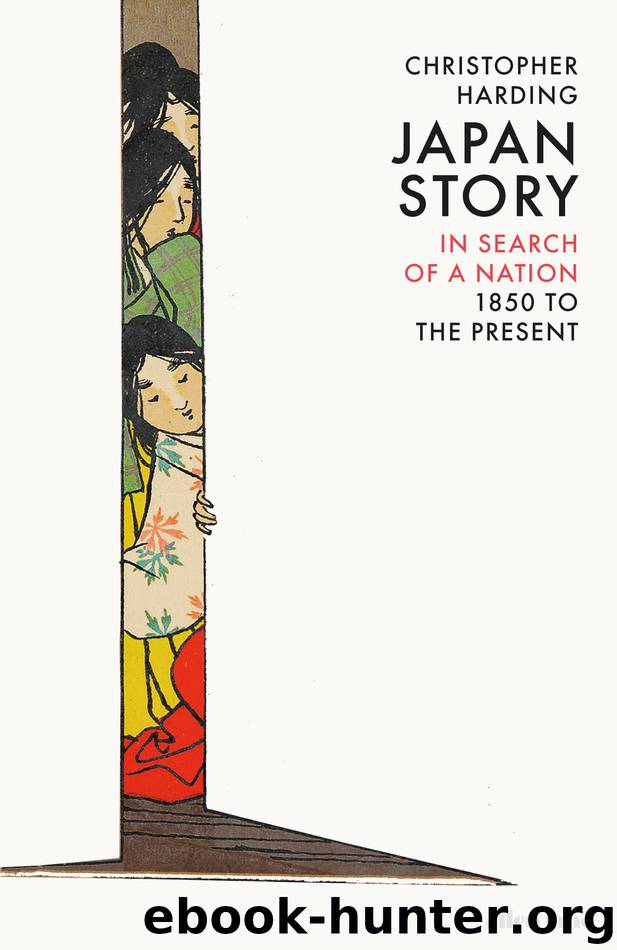Japan Story by Christopher Harding

Author:Christopher Harding
Language: eng
Format: epub
ISBN: 9780141985367
Publisher: Penguin Books Ltd
Published: 2018-09-26T00:00:00+00:00
When he had finished reading out the note, Whitney announced that the people in this room were now a constituent assembly. They had until 12 February to turn MacArthur’s words into a Constitution for Japan.
Much had already happened in the five months up to this point, since MacArthur landed in Japan. Gone was the Peace Preservation Law of 1925, restricting people’s liberties – though its rescinding in October 1945 did not come soon enough for prisoners like the philosopher Miki Kiyoshi: disillusioned with what became of the Greater East Asia Co-Prosperity Sphere ideal, he had fallen out with the authorities and eventually been jailed, dying in prison in late September 1945, almost a month into the Occupation. Gone was the Special Higher Police Force, many of whose members simply melted away into other parts of Japan’s vast bureaucracy. Gone were the Japanese Army and Navy, along with the empire they had built: Korea, Manchukuo, Taiwan and territories across mainland China and out into the Pacific. Gone – and in the process of going – were tens of thousands of politicians, police, teachers, publishers and other influential individuals whose names featured on a laboriously researched list of undesirables. And gone, already, were a large number of American GIs: with Occupation turning out to be a much less bloody business than some had feared, one of the two American armies sent to Japan had promptly left again.
There were few signs of popular opposition in Japan to any of these American initiatives. Many people felt little but dismay, even hatred, towards their wartime leaders: for embroiling the country in conflict; for lying about Japan’s prospects and progress as it unfolded; and for failing to protect people against unnecessary suffering by surrendering as soon as the cause was clearly lost.
And yet the language of MacArthur’s February note was replete with bold talk of what ‘is’ and what Japan ‘does’. How could he know? It was reminiscent of Yoshino Sakuzō’s notion of minponshugi from a couple of decades before: offering government ‘for’ the people, catering to interests of which they were presumed to be too uneducated to be aware. So far, under the Occupation, ‘by the people’ involved the fairer hiring of functionaries – from December 1945, women could vote and be voted for in general elections – rather than a fair hearing for people’s post-war aspirations before major constitutional suggestions were made.
Beate Sirota acquired an epoch-making role here, in the most casual of ways. The new Constitution was to have something of which generations of Japanese feminists had only been able to dream: a section on women’s rights. Beate’s boss turned around to her shortly after Whitney’s constitutional announcement and said, simply: ‘You’re a woman. Why don’t you do it?’
Beate did at least have a better claim than MacArthur to know how Japanese women lived and what they might want and need, having grown up in the country. And she took to her task with speed, dashing around Tokyo in an army jeep, ransacking
Download
This site does not store any files on its server. We only index and link to content provided by other sites. Please contact the content providers to delete copyright contents if any and email us, we'll remove relevant links or contents immediately.
| Africa | Americas |
| Arctic & Antarctica | Asia |
| Australia & Oceania | Europe |
| Middle East | Russia |
| United States | World |
| Ancient Civilizations | Military |
| Historical Study & Educational Resources |
The Tale of Genji (unabridged) by Shikibu Murasaki(1035)
Japan by Edwin Reischauer(956)
The Complete Guide to Japanese Drinks by Stephen Lyman & Chris Bunting(932)
Shogun by James Clavell(874)
Native American in the Land of the Shogun: Ranald MacDonald and the Opening of Japan by Frederik L. Schodt(815)
The Pacific War by Robert O'Neill(802)
Japanese Notebooks by Igort(801)
Japanese Candlestick Charting by Steve Nison(759)
Shogun (The Asian Saga Chronology) by James Clavell(753)
Last Mission to Tokyo by Michel Paradis(751)
The Pillow Book by Sei Shonagon(730)
Bushido Explained by Alexander Bennett(728)
Ninja Fighting Techniques by Stephen K. Hayes(715)
The Dutch Encounter with Tokugawa Japan by Adam Clulow(710)
The Great Road by Smedley Agnes;(701)
Last Mission to Tokyo: The Extraordinary Story of the Doolittle Raiders and Their Final Fight for Justice by Michel Paradis(659)
Underground: The Tokyo Gas Attack and the Japanese Psyche by Haruki Murakami(658)
People Who Eat Darkness by Richard Lloyd Parry(654)
Comfort Woman by Maria Rosa Henson(648)
